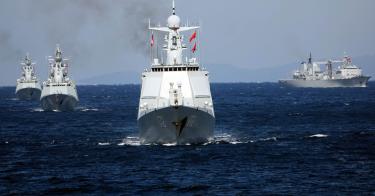China’s dogged campaign to build a global network of commercial ports and naval bases has now reached the Solomon Islands. And the draft basing agreement between the two countries, leaked last Thursday, gives the West plenty of reason for concern.
If enacted, this agreement would allow China to dispatch troops and ships to the Solomons to maintain “social order.” That would put Chinese forces near vital U.S. bases in Guam and deep in a region critical for Australian security.
This is just the latest advance in China’s recently intensified pursuit of overseas bases—not just in the South Pacific but also in Africa and Southeast Asia. If successful, these efforts would pose considerable threats to U.S. military operations. It would be strategic malpractice to ignore them.
The drive to establish foreign naval bases is part of Beijing’s comprehensive strategy to undermine U.S. military commitments around the world.
Cleo Paskal, a South Pacific expert with the Foundation for Defense of Democracies, has warned of a China island campaign—using political warfare to burrow into and influence governments of Pacific island nations.
>>> U.S. Military Forces Cannot Fight on 2 Fronts
That certainly seems to be the case in the Solomons. Prime Minister Manasseh Sogavare’s pro-China policies have sparked months of violent protests. Hence, Sogavare’s interest in lining up Beijing’s aid in “maintaining social order.”
Charles Edel, the Australia chair at the Center for Strategic & International Studies, goes further. He believes that what we are seeing today is the near-culmination of a decade-long Chinese effort to build a chain of military bases across the Pacific.
Beijing, of course, denies anything of the sort. After all, the Chinese Communist Party has publicly committed itself to "noninterference" in other nation's domestic affairs. So, it couldn't possibly be roiling the political waters in the Solomons, right?
It has also repeatedly denied having any hegemonic designs, so what would be the point of establishing military bases abroad? Indeed, Chinese Communist Party spokesmen for decades claimed that establishing any overseas base would not be in line with party orthodoxy. They stuck to that story right up until 2017 when China established a base in Djibouti.
The reality is that Chinese communist strategy is remarkably pliable. Securing the party’s power is ever paramount; all else is secondary and subject to change. China’s ongoing overseas-basing campaign should be viewed through this lens.
Concern over this initiative started heating up late last year when it came to light that China was exploring creating a naval base in Equatorial Guinea. If China were to secure this base, it would give Beijing sustained access to significant oil reserves and the ability to monitor sensitive allied missile testing in the South Atlantic.
>>> A Conflict-Ready Coast Guard Is Vital to U.S. Success in a Long War with China
China also appears to be accelerating construction of a new naval base in Cambodia. The new facility is on the site of U.S.-built facilities, which Cambodia demolished in 2020 following reports of a secret 2019 agreement to host a Chinese naval base. As in Equatorial Guinea, this new base would enhance China’s dominance of the South China Sea while further embedding Cambodia into its strategic orbit.
In the decades following the Cold War, the U.S. and its allies significantly reduced and consolidated their military footprints. They are now left with few bases in Southeast Asia and the South Pacific. This, and the 20 years of war in Iraq and Afghanistan, created a naval vacuum that China is filling.
Moreover, the reduction in U.S. logistics and repair facilities has simplified China’s war planning. Beijing can now degrade critical U.S. bases in Japan and Guam, just by hitting a handful of targets with its advanced ballistic missiles. To mitigate this threat, the U.S. and its allies have had to disperse their forces and look for new facilities.
China's move in the Solomons is remarkably troubling. To wield a small Navy effectively, retain allies, and uphold freedom of the sea, the U.S. needs to better constrain the metastasis of Chinese military posture.
This piece originally appeared in RealClearDefense




